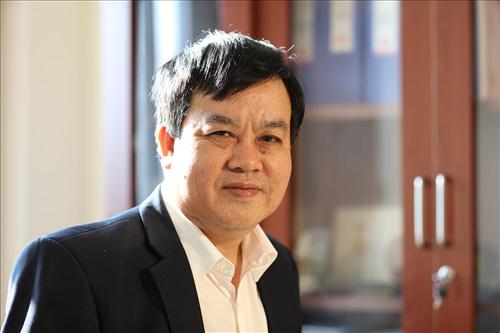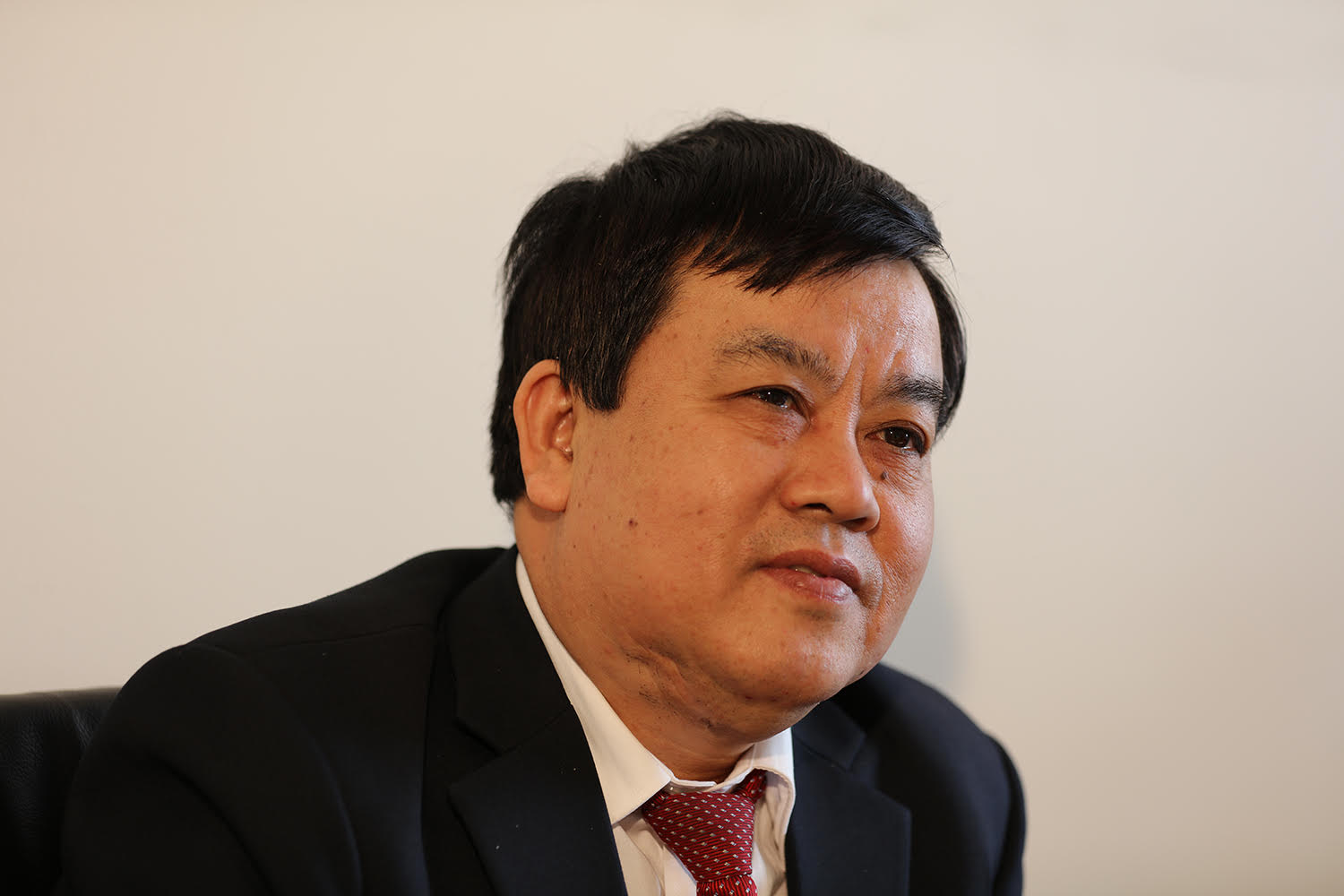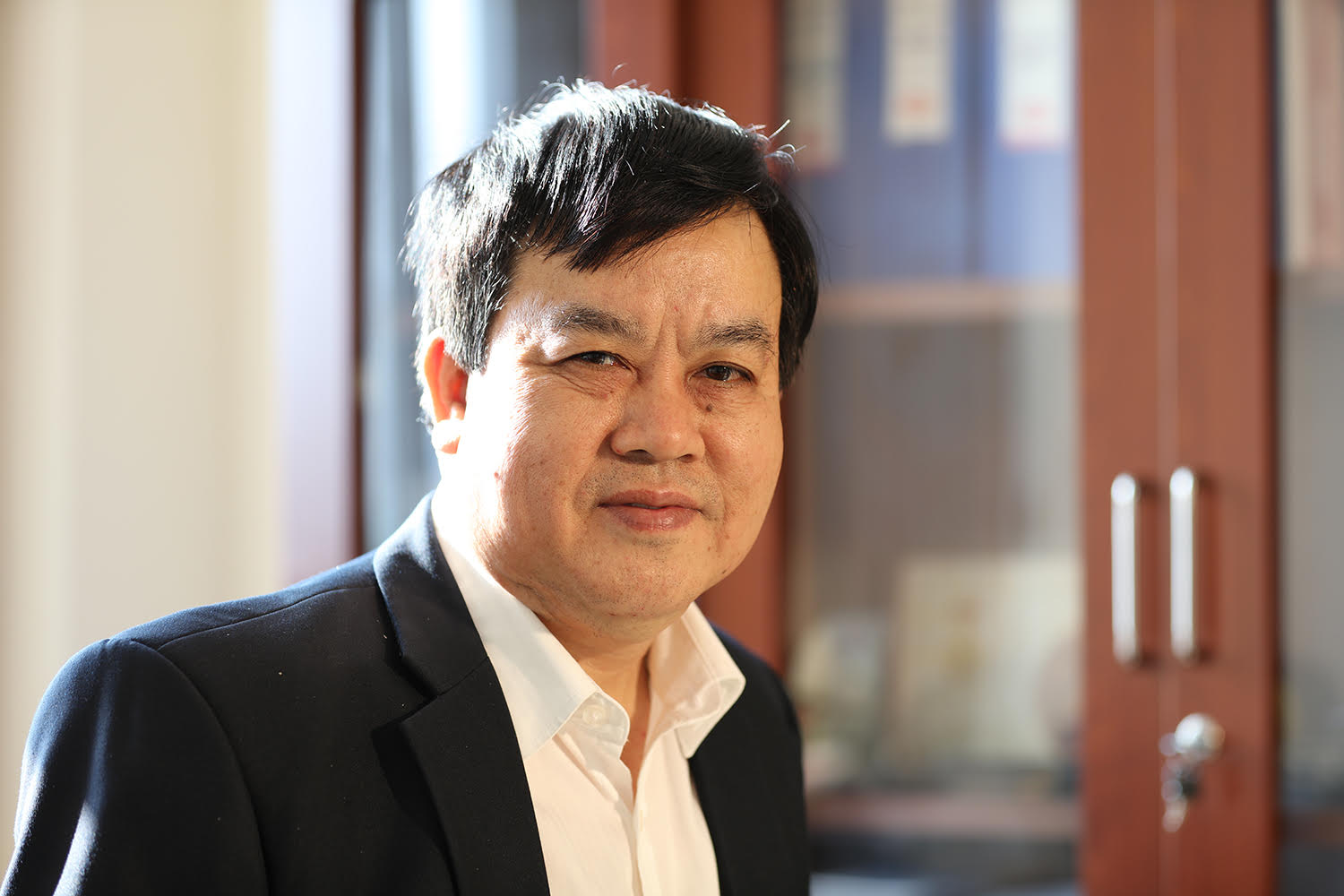
Realm of Memories
Associate Professor Dr. Dinh Van Huong was born and raised in the central region of Vietnam, where the cool, green Lam River flowed, easing the hardships of his mother. Hung Linh commune, Hung Nguyen district, is where he left behind countless memories of joy, sorrow, and hardship. Although he has been away from his homeland for a long time, the memories of this son far from home never fade. He confided: “Every time I return home, I see my mother's back hunched a little more, and the betel nut I chew takes longer to develop its rich, sweet and spicy flavor. The dikes, the rice paddies, the river – where corn and cassava replaced rice to feed the people, and the whole village was then soaked with the salty sweat of the land.”
My mother, advanced in age, had painstakingly raised me for decades. In 1970, the family received devastating news: my beloved father had died in battle in Quang Tri. Grief and sorrow weighed heavily on my mother's shoulders. Out of love for my mother, I strived in my studies, simultaneously supporting her through this pain. My academic achievements were a source of encouragement and comfort for her and my family. In high school, I passed the entrance exam for the specialized literature program at Phan Boi Chau High School, a prestigious high school in Nghe An province. Furthermore, I was a dynamic and active class and Youth Union officer, participating in various social activities. In 1980, I achieved high scores when applying to the Faculty of Literature at Hanoi University, and was one of four selected to study journalism in the Soviet Union. After more than 10 years of studying in Russia, he graduated from university with a degree in Journalism, continued his postgraduate studies, and successfully defended his doctoral dissertation in Journalism. During this period, he had the opportunity to study at Lomonosov University – a world-renowned university.

Assoc. Prof. Dr. Dinh Van Huong (Photo: Thanh Long)
Contributions to the field of Journalism and Media
After completing his PhD, he returned to his homeland and took up a position at his beloved alma mater: the Journalism Department, Hanoi University (which had only been established for one year at that time). In the early days, there were numerous shortages. Books and textbooks were almost nonexistent, while the need for journalism training was increasingly evident, and the university urgently needed to prepare for the opening of a new training program. To meet the initial needs for journalistic materials, he was tasked by the Department Head and other scientists with translating and writing new basic materials on Journalism and Communication. Just one year later, the book "Theoretical Foundations of Journalism and Communication," co-authored with Associate Professor Duong Xuan Son and Professor Tran Quang, was edited and printed, becoming the department's first theoretical book for training and research. He also spearheaded the development of scientific research topics to support teaching, such as the topic "Journalism and the Issue of Population and Family Planning." “Journalism and the issue of legal education for young people,” etc… He was also active in publishing books on journalism such as: Journalism - Theoretical and Practical Issues; Time and Witnesses; Current News in Journalism…
As someone with formal training in a country with a modern and advanced media industry, the research and selection of training programs and courses is essential. Professor Dinh Van Huong believes that in our country, journalistic activities have unique characteristics; the press is a tool for the Party's ideological work, the voice of the State, and a reliable forum for the people. Journalistic activities must prioritize the interests of the Party, the nation, and the people above all else. The vibrant reality of media activities shows that theory must precede development to anticipate and guide progress in the right direction. There are two issues that we see Professor Dinh Van Huong has clearly understood and expressed in his mission of training and researching journalism.
Firstly, since 1995, five years after the establishment of the Faculty of Journalism and Communication, Professor Dinh Van Huong recognized the crucial role of law and journalistic ethics in journalistic practice. Journalism is informational activity, capable of disseminating information and shaping public opinion, providing the fastest possible direction; the power of information is no less than the power of material things. Therefore, law and journalistic ethics are highly valued. Besides having vision and talent, journalists also need professional ethics, as it reflects their attitude and responsibility to the community and society. Journalists not only need to master the law and understand it as citizens, but also need a compassionate heart, altruism, and above all, honesty.

Based on those thoughts, he registered to develop a course: Law and Ethics in Journalism, aiming to equip and introduce future journalists to the State's legal system and professional ethical conduct. In the early years of its development, it was just a series of lectures, gradually becoming an elective course and now a compulsory course in the faculty's journalism training program. The current reality of journalism and media has proven his foresight.
Secondly, in recent years, many scientists and managers have predicted that the development direction of the media industry will be the establishment of media conglomerates. This is a new and strategic issue. On various forums, Professor Dinh Van Huong has shared his thoughts and assessments on specific steps to take. This involves the formation of media groups. This is clearly demonstrated in the development of Vietnamese journalism, even during the colonial period, there were media groups such as the Indochina Magazine group led by Nguyen Van Vinh, and then the Tao Dan group in the 1930s. Today, media groups of various units, ministries, and sectors also operate as groups, such as Tuoi Tre, Thanh Nien, Cong An Nhan Dan, Voice of Vietnam, etc. The individual development of media organizations is not broad enough for journalism to develop and integrate into the media activities of countries with developed journalism. At the same time, the economic and technological conditions are not yet strong enough to support rapid and sustainable development. Therefore, a proper roadmap is needed to move towards becoming a professional media corporation.
For over ten years as Head of the Faculty of Journalism and Communication, he made significant contributions to the organization of the unit and the development and innovation of training programs to suit the realities of life. The faculty's human resources are primarily selected and planned from outstanding students with the potential to become teaching staff. Currently, this workforce is contributing significantly to the faculty in teaching, scientific research, and unit management. Many of them now hold positions as heads and deputy heads of the faculty and are continuing to develop their abilities to build a strong and thriving faculty. In training, he advocates for the integration of theory and practice so that students have a solid foundation of scientific knowledge and professional skills, enabling them to produce media content right from their studies. It can be said that students of the Faculty of Journalism and Communication have mastered the classroom and their lessons, maximizing their knowledge acquisition.
All those thoughts and actions speak volumes about his passion for teaching and research. Ahead lie towering peaks of knowledge. On that arduous path, he continues to conquer, regardless of his position!
|
Associate Professor, Doctor, Distinguished Teacher Dinh Van Huong
+ Management positions held: Head of the Faculty of Journalism and Communication (2001-2011). Secretary of the Youth Union, University of Social Sciences and Humanities (1995-1998). Head of the Political and Student Affairs Department - Vietnam National University, Hanoi (2011 to present).
Theoretical foundations of journalism and communication(co-authored), Vietnam National University, Hanoi Publishing House, 2004. Organization and operation of the editorial office,Vietnam National University, Hanoi Publishing House, 2003. News reporting genres,Vietnam National University, Hanoi Publishing House, 2006. Journalism - Theoretical and Practical Issues(co-authored), Education Publishing House and Vietnam National University Hanoi Publishing House, 9 volumes, from 1994 to 2014. Press and media coverage of population and family planning.(co-authored), Vietnam National University Hanoi Publishing House, 2 volumes (1997 and 1999). Types of journalism (co-authored), Ho Chi Minh City National University Publishing House, 2005. Journalism(co-authored), Kim Dong Publishing House, 2006. Media culture in the era of integration(co-authored), Information and Communications Publishing House, 2013. Some Issues Regarding the Economics of Print Media, Vietnam National University, Hanoi Publishing House, 2015. |
Author:MSc. Pham Dinh Lan